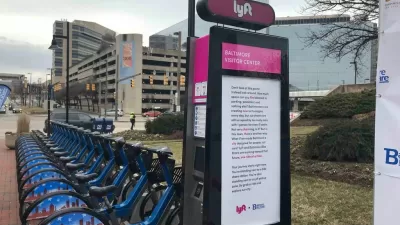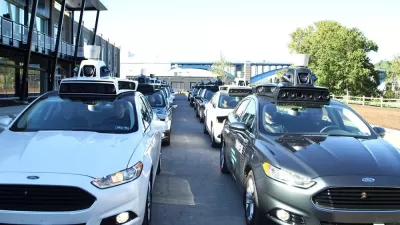A new study from KPMG predicts that the U.S. will go from a majority multi-car household to one where only 43% of households have more than one motor vehicle by 2040, and rideshare and car-share, along with demographic changes, will play key roles.

"As a growing number of consumers participate in car sharing [e.g., Zipcar], wait longer to buy their first vehicle and move to the suburbs, KPMG predicts that in about 25 years, fewer than half of U.S. households will own more than one vehicle," writes Phil LeBeau of CNBC.
According to the report, 57 percent of American households currently have two or more cars. Although that percentage has held relatively steady over the last couple of decades. Gary Silberg, (a partner at KPMG who conducted the study and heads KPMG's automotive practice) forecasts it will fall to 43 percent by 2040. That's thanks, in part, to the growing popularity of ride-share [e.g., Uber] companies.
The report is not centered on declining auto ownership, however. It is about the changing auto marketplace, and how auto manufacturers need to be innovative to survive. KPMG's press release states, "In its latest whitepaper, “Me, My Car, My Life [PDF],” KPMG’s automotive practice suggests that the era of ubiquitous connectivity - the moment when you, your car and your life are one - has arrived."
Greg Gardner of the Detroit Free Press adds to the dialogue on the future of car ownership by writing about a related, if conflicting talk given by Ford Motor Co. executive chairman Bill Ford in Dubai on Nov. 19.
Where the KPMG study and Ford diverged was on the role the traditional auto industry will play in solving the challenge of urban mobility.
Gardner indicates that whereas Ford sees the auto industry rising to the occasion to meet urban residents' mobility needs, Silberg foresees "displacement of the status quo." "We will see new players surge forth, some old players reinvent themselves and others totally left behind", said Silberg.
"What if autonomous driving could extend the driving life of the elderly?" Ford asked. "What if this technology could enable them to maintain the personal freedom that comes from mobility? Imagine how that could improve their quality of life, and reduce some of the dependency on caregivers."
"Silberg held firm to his projection that technology will deliver alternatives to individual vehicle ownership," writes Gardner.
"Owning a car is not the most rational economic decision," he said. "The average price of a car is around $31,000. The minute you drive it off the lot you lose 11% and, by the way, it sits idle 90% of the time."
FULL STORY: Wave goodbye to the two-car family

Trump Administration Could Effectively End Housing Voucher Program
Federal officials are eyeing major cuts to the Section 8 program that helps millions of low-income households pay rent.

Planetizen Federal Action Tracker
A weekly monitor of how Trump’s orders and actions are impacting planners and planning in America.

Ken Jennings Launches Transit Web Series
The Jeopardy champ wants you to ride public transit.

California Invests Additional $5M in Electric School Buses
The state wants to electrify all of its school bus fleets by 2035.

Austin Launches $2M Homelessness Prevention Fund
A new grant program from the city’s Homeless Strategy Office will fund rental assistance and supportive services.

Alabama School Forestry Initiative Brings Trees to Schoolyards
Trees can improve physical and mental health for students and commnity members.
Urban Design for Planners 1: Software Tools
This six-course series explores essential urban design concepts using open source software and equips planners with the tools they need to participate fully in the urban design process.
Planning for Universal Design
Learn the tools for implementing Universal Design in planning regulations.
Ada County Highway District
Clanton & Associates, Inc.
Jessamine County Fiscal Court
Institute for Housing and Urban Development Studies (IHS)
City of Grandview
Harvard GSD Executive Education
Toledo-Lucas County Plan Commissions
Salt Lake City
NYU Wagner Graduate School of Public Service





























